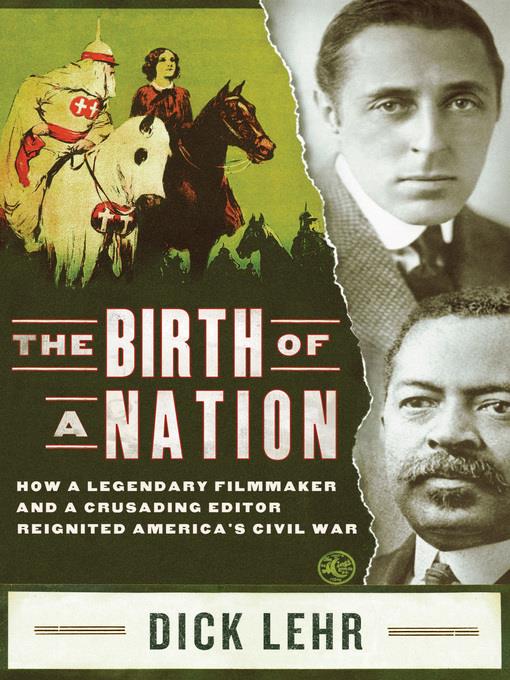
The Birth of a Nation
How a Legendary Filmmaker and a Crusading Editor Reignited America's Civil War
کتاب های مرتبط
- اطلاعات
- نقد و بررسی
- دیدگاه کاربران
نقد و بررسی

Starred review from October 15, 2014
A history of D.W. Griffith's The Birth of a Nation (1915), which triggered a substantial protest by Africans-Americans, who resented their vile portrayal in the film. Former Boston Globe journalist Lehr (Journalism/Boston Univ.; The Fence: A Police Cover-up Along Boston's Racial Divide, 2009, etc.) reintroduces readers to William Monroe Trotter (1872-1934), a crusading black journalist in Boston who was involved in a number of protest actions against institutional racism. The author frequently alternates the focus between Griffith and Trotter, so we learn their back stories along the way. His two principals were different in just about every way: Trotter's father, though born into slavery, somehow made his way to Boston; he fought with the 55th and 54th Massachusetts infantries. Trotter went to Harvard and became friends with William Lloyd Garrison and W.E.B. Du Bois. However, jobs were tough to find, so he set up his own newspaper, the Guardian. David Wark Griffith (1875-1948) was from Kentucky, "a child," writes Lehr, "in search of a bedtime story." Griffith tried acting, writing and directing, and he pioneered (if not invented, as he claimed) some narrative techniques that directors continue to employ. Trotter, becoming an activist, drew his bead on Booker T. Washington (too accommodating, Trotter thought); Griffith thought Thomas Dixon's 1905 novel The Clansman (about the heroic KKK) would make a great film. So the clash commenced. Lehr carefully charts the arcs of the dispute: the behavior of public officials (not good), the protests at the movie theaters, the actions in the courts, the responses of whites (they loved the film) and blacks (who despised it for its view of them as primitives). We learn a lot, as well, about the making and marketing of the film and its uneasy status today. A powerful rendering of an enduring conflict.
COPYRIGHT(2014) Kirkus Reviews, ALL RIGHTS RESERVED.

Starred review from October 15, 2014
Representation, race, and censorship come into heated conflict in this page-turner by former Boston Globe reporter Lehr (journalism, Boston Univ.; Whitey). Centered on the release of the now-infamous 1915 film The Birth of a Nation, Lehr tells the story of two flawed men--self-promoting Southern filmmaker D.W. Griffith and uncompromising journalist William Monroe Trotter--and their vehement public confrontation over the film's racist depiction of American slaves and slavery. Beginning with both men's family histories and continuing through their respective careers in entertainment and political activism, Lehr succeeds in drawing a tenuous parallel between the development of both Griffith and Trotter's personalities, from their highly influential father figures to their occasionally parallel moments of desperation and success. The book culminates, as expected, with the highly publicized battle in Boston over the censorship of Griffith's film. However, the larger story for the reader is Lehr's fascinating portrait of simmering American racial tensions moving into the early 20th century, and his spotlight on men and women who, intentionally or not, helped galvanize painful and necessary conversations about civil rights, race relations, and the power of mass media for decades to come. VERDICT Recommended for students and fans of film, race and ethnic studies, and U.S. history.--Robin Chin Roemer, Univ. of Washington Lib., Seattle
Copyright 2014 Library Journal, LLC Used with permission.

Starred review from November 15, 2014
In 1915, race relations in the U.S. were quite fragile with much unfinished business from the Civil War and Reconstruction, blacks still agitating for equal rights and whites still resisting. That year, filmmaker D. W. Griffith stunned the American public with his blockbuster film The Birth of a Nation, recasting the image of the South as a chivalrous culture destroyed by Northern aggression that freed a barbaric people. Monroe Trotter, a fiery journalist and black-rights advocate, took issue with Griffith and his film, igniting a protest that sparked agitation across the nation. Griffith, a failed actor, was remarkably talented in the newly emerging art of filmmaking. He'd grown up listening to the tall tales of his father, a former officer in the Confederate army. Trotter's father had served in the Union army. Among the first black graduates of Harvard, Trotter was radicalized by the limits placed on race and the accommodationist rhetoric of Booker T. Washington. Journalism scholar Lehr skillfully builds the tension in the respective lives and careers of these two mentheir trials and triumphs, frustrations and visionsas they head for a collision course on the issues of free speech and civil rights, with Trotter crusading to censor Griffith's film. This is a remarkable look at the power of mass media and the nascent civil rights movement at a pivotal time in American history.(Reprinted with permission of Booklist, copyright 2014, American Library Association.)

























دیدگاه کاربران